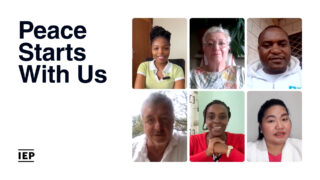Around the world, conflict is on the rise. From wars and conflict in Ukraine and Iran, Gaza and Sudan, to the economic collapse fuelling unrest in Venezuela and Haiti, the headlines are a daily reminder of a world under immense pressure. It is easy to feel that peace is beyond reach.
But behind those headlines, another story is emerging. Quietly, powerfully, a global network is being activated. They are not politicians or generals. They are community leaders, students, engineers, public servants, and educators. Leading the way are the 2025 graduating class of the IEP Ambassador program, and they are reshaping the future, one community at a time. Created by the Institute for Economics & Peace (IEP), the IEP Ambassador Program gives individuals from all backgrounds the knowledge and resources to use IEP’s latest research, methodology and data to foster peace in their communities.
In Cameroon, Hendoka Essome Joel has spent more than a decade working with youth in conflict-prone regions. For him, peace is not just the silence of guns. “It is the presence of justice, inclusion and opportunity,” he says. He’s now leading a digital advocacy initiative to empower young leaders to counter misinformation and promote civic values. “We’re training them to use digital tools to build peace – online and offline.”
That sense of agency, of moving from passive witness to active participant, is a common thread across the ambassadors’ stories.
From Kenya, Janet Nandwa Ongoli shares a simple but powerful truth: “Peace is everyone’s business. It starts with what we build. Not just what we stop.” Her vision is to grow a community-led peace hub — not imposed from above, but rising from the grassroots.
That local focus is echoed in the words of John Nenger, an engineer from Nigeria who has lived with instability and inequality all his life. “I’ve seen how the absence of conflict does not mean the presence of peace,” he says. He plans to bring together youth, faith leaders and market women in Abuja to hold conversations about peace, economic fairness, and accountability. “Peace is not passive,” he insists. “It’s something we must build intentionally, collectively, and boldly.”
Across continents, their goals are strikingly similar: to turn the theory of peace into practice. To make it real.
Mylene Carbonell, from the Philippines, puts it this way: “True peace isn’t just about the absence of conflict. It’s about giving people the resources to thrive – education, livelihoods, opportunities. That’s how we break the cycle of disadvantage.”
This approach is grounded in the concept of Positive Peace, a framework developed by the IEP that defines peace not only by what it avoids (war and violence), but by what it builds: equitable economies, good governance, free access to information, and respect for human rights.
For Bernie Mayall, who lives in coastal Dover in the UK, the journey to understanding Positive Peace was both personal and profound. After suffering a heart attack during her first attempt at the course, she returned after her recovery, determined to finish what she started. “It felt overwhelming at times,” she reflects. “But also too short, I want to know more.”
Her key takeaway? That peace is not about people far away.
“It’s about all of us, all of our communities.”
This shared urgency to act, not later, not elsewhere, but now and right here, animates each graduate’s story.
In Albania, Sabrina Qypi, a data analyst with the national police, is launching a youth-led digital safety program to combat the online abuse she sees in her work.
“Peace is not something we wait for,” she says. “It’s something we create.”
Betelhem Zerihun, from Ethiopia, agrees: “We must stand together for peace, not for politics or business, but for our survival.”
Even in countries with longstanding democratic traditions, the work of peacebuilding is no less critical. In the United States, Michael Hayes, a Rotarian and community leader in Texas, is helping local groups apply the Positive Peace framework to strengthen social bonds.
“Peace begins with the relationships between people,” he says. “And if those relationships aren’t built on trust and respect, then peace is just not possible.”
That foundation of mutual respect and shared responsibility is central to the vision of Wam Nelly-Lucy Mbu, who has lived with conflict in Cameroon for the past eight years.
“Peace is not just the absence of violence,” she says. “It’s the presence of justice and opportunities. I want to be part of the solution, not just a witness.”
This growing network of peacebuilders doesn’t pretend to have easy answers to the world’s most entrenched conflicts. But their work reminds us of something more powerful: that peace does not begin in the halls of governments or the corridors of the UN. It begins in the classroom, the market, the street and the digital space. It begins in relationships, in dialogue, and in shared hope.
In a world teetering between fragmentation and resilience, despair and determination, the IEP Peace Ambassador class of 2025 offers a different narrative. Not one of naïve optimism, but of grounded, practical action. Not one of silence, but of choice and a refusal to accept that it doesn’t have to be this way.
Peace Starts With Us.
Watch full video below:
We hope this series inspires you to reflect, engage, and take part. Share what peace means to you, and how you’re working to bring it to life in your community.
Get involved:

Share what peace means to you, and how you're working to bring it to life in your community.
Watch. Comment. Share.